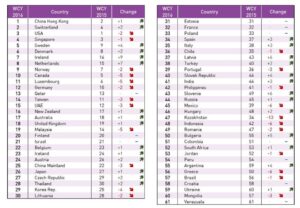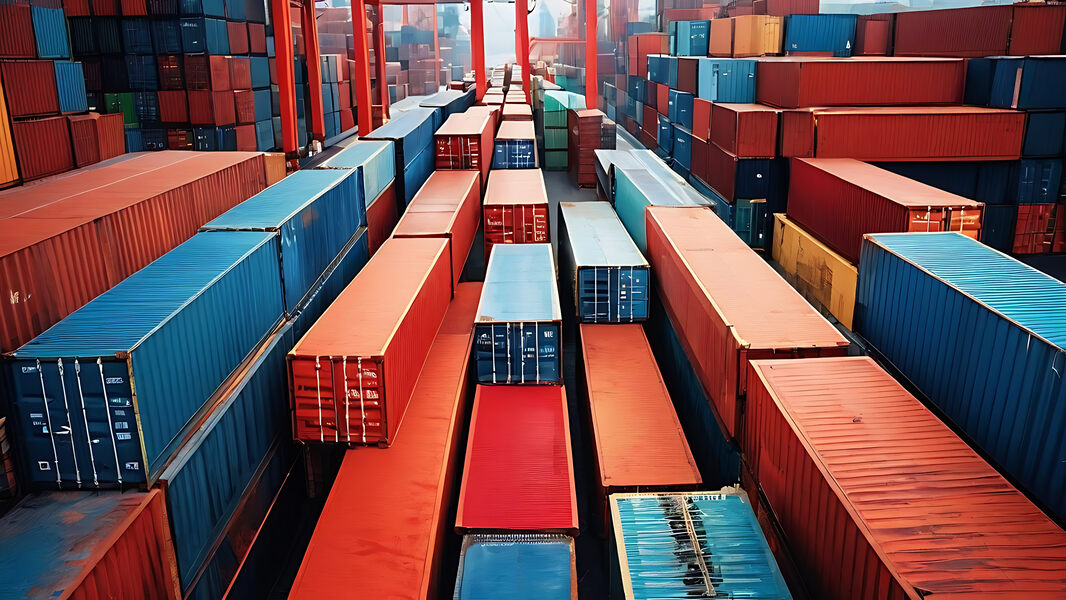
IMD Releases Its 2016 World Competitiveness Ranking
LAUSANNE – (May 30, 2016) – The USA has surrendered its status as the world’s most competitive economy after being overtaken by China Hong Kong and Switzerland, according to the IMD World Competitiveness Center.
The sheer power of the economy of the USA is no longer sufficient to keep it at the top of the prestigious World Competitiveness Ranking, which it has led for the past three years.
The IMD World Competitiveness Center, a research group within IMD business school, has published the ranking each year since 1989 and it is widely regarded as the foremost annual assessment of the competitiveness of countries.
The 2016 edition ranks China Hong Kong first, Switzerland second and the USA third, with Singapore, Sweden, Denmark, Ireland, the Netherlands, Norway and Canada completing the top 10.

Professor Arturo Bris, Director of the IMD World Competitiveness Center, said a consistent commitment to a favourable business environment was central to China Hong Kong’s rise and that Switzerland’s small size and its emphasis on a commitment to quality have allowed it to react quickly to keep its economy on top.
“The USA still boasts the best economic performance in the world, but there are many other factors that we take into account when assessing competitiveness,” he said.
“The common pattern among all of the countries in the top 20 is their focus on business-friendly regulation, physical and intangible infrastructure and inclusive institutions.”
A leading banking and financial center, China Hong Kong encourages innovation through low and simple taxation and imposes no restrictions on capital flows into or out of the territory.
It also offers a gateway for foreign direct investment in China Mainland, the world’s newest economic superpower, and enables businesses there to access global capital markets.
China Hong Kong and Singapore aside, however, the research suggests Asia’s competitiveness has declined markedly overall since the publication of last year’s ranking.
Taiwan, Malaysia, Korea Republic, and Indonesia have all suffered significant falls from their 2015 positions, while China Mainland declined only narrowly retaining its place in the top 25.
The study reveals some of the most impressive strides in Europe have been made by countries in the East, chief among them Latvia, the Slovak Republic and Slovenia.
Western European economies have also continued to improve, with researchers highlighting the ongoing post-financial-crisis recovery of the public sector as a key driver.
Meanwhile, 36th-placed Chile is the sole Latin American nation outside the bottom 20, while Argentina, in 55th, is the only country in the region to have improved on its 2015 position.
Each ranking is based on analysis of over 340 criteria derived from four principal factors: economic performance, government efficiency, business efficiency and infrastructure.
Responses from an in-depth survey of more than 5,400 business executives, who are asked to assess the situation in their own countries, are also taken into consideration.
Professor Bris said: “One important fact that the ranking makes clear year after year is that current economic growth is by no means a guarantee of future competitiveness.
“Nations as different as China Mainland and Qatar fare very well in terms of economic performance, but they remain weak in other pillars such as government efficiency and infrastructure.”
Data gathered since the first ranking was published more than 25 years ago also lend weight to fears that the rich are getting richer and the poor poorer, said Professor Bris.
“Since 1995 the world has become increasingly unequal in terms of income differences among countries, although the rate of increase is now slowing,” he said.
“The wealth of the richest countries has grown every year except for the past two, while the poorer countries have seen some improvement in living conditions since the millennium.
“Unfortunately, the problem for many countries is that wealth accumulation by the rich doesn’t yield any benefits for the poor in the absence of proper social safety nets.
“Innovation-driven economic growth in poorer countries improves competitiveness, but it also increases inequality. This is obviously an issue that demands long-term attention.”
Research Information & Knowledge Hub for additional information on IMD publications

How China's journey of self-reliance, innovation, and strategic resilience under "Made in China 2025" continues to redefine its global role amid ongoing geopolitical tensions and renewed policy challenges.

Your gut instinct matters in a data-driven world. IMD’s Heather Cairns-Lee & Eugene Sadler-Smith explain how intuition enhances decision-making in uncertainty.
With stagnant import volumes since 2021, and import prices at levels below those suggested by fundamentals, foreign exporters face an uphill battle to convert access to the Chinese market into revenues. Notably, the volume stagnation predates the ...

Early in his career, Dolf van den Brink did everything he could to project an image of authority – including wearing spectacles he didn’t need. It wasn’t until he learned to be comfortable in his skin that he began to excel as a leader, he tells ...
It has become conventional wisdom to view Europe as an economic powerhouse past its prime, overshadowed by the steady advance of the US and meteoric rise of China. Critics cite Europe’s shrinking share of global GDP, excessive regulation, and slug...
Now in its eighth year, the 2024 IMD World Digital Competitiveness Ranking measures the capacity and readiness of 67 economies to adopt and explore digital technologies as a key driver for economic transformation in business, government, and wider...

A balanced assessment of the past eight years is that, in terms of trade policy, America has turned protectionist, implementing significant measures to restrict domestic market access to foreign (non-US) imports.

Key minds behind the Hinrich-IMD Sustainable Trade Index – Deborah Elms, Chuin Wei Yap, Christos Cabolis, and Simon Evenett – explain how decision-makers can benefit from looking at industrial policy in granular detail, given its resurgence and th...
Inflows of foreign direct investment into China shows worrying trends despite its massive economy. While total FDI appears substantial at $163B in 2023, most growth comes from existing foreign subsidiaries rather than new entrants. Foreign manufac...

Climate change, geopolitical frictions, and supply chain disruptions call for more sustainable trade practices that can withstand the pressures of volatility. But for trade to be sustainable, it must also be resilient. IMD World Competitiveness Ce...
Research Information & Knowledge Hub for additional information on IMD publications
Research Information & Knowledge Hub for additional information on IMD publications
Research Information & Knowledge Hub for additional information on IMD publications
Research Information & Knowledge Hub for additional information on IMD publications
Research Information & Knowledge Hub for additional information on IMD publications
IMD World Competitiveness Center Report, 14 November 2024, 8th edition
Research Information & Knowledge Hub for additional information on IMD publications
Research Information & Knowledge Hub for additional information on IMD publications
Research Information & Knowledge Hub for additional information on IMD publications
Research Information & Knowledge Hub for additional information on IMD publications
Research Information & Knowledge Hub for additional information on IMD publications

